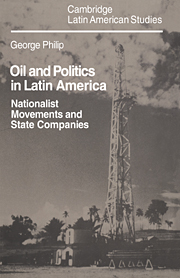Book contents
- Frontmatter
- Contents
- List of tables
- Preface
- Glossary
- Abbreviations
- Note on currencies and other units of measurement
- Maps: Latin America in 1920, 1940, 1960 and 1981; showing importing countries, exporting countries and countries self-sufficient in oil
- Introduction: The politics of oil in twentieth-century Latin America
- Part I The world oil environment
- Part II The major expropriations
- 7 Politics and the concession contract
- 8 Argentina: YPF, Yrigoyen and the 1935 oil law
- 9 Some nationalisations of the 1930s: Chile, Uruguay, Bolivia
- 10 Cárdenas and the Mexican oil nationalisation
- 11 The formation of Petrobrás
- 12 The nationalisation of the ipc in Peru
- 13 The nationalisation of Gulf Oil in Bolivia 1969
- 14 Oil politics in Ecuador 1972–6
- 15 The nationalisation of oil in Venezuela
- 16 Oil companies and governments in twentieth-century Latin America
- Part III The state oil companies
- Notes and bibliography
- Index
- CAMBRIDGE LATIN AMERICAN STUDIES
10 - Cárdenas and the Mexican oil nationalisation
Published online by Cambridge University Press: 23 December 2009
- Frontmatter
- Contents
- List of tables
- Preface
- Glossary
- Abbreviations
- Note on currencies and other units of measurement
- Maps: Latin America in 1920, 1940, 1960 and 1981; showing importing countries, exporting countries and countries self-sufficient in oil
- Introduction: The politics of oil in twentieth-century Latin America
- Part I The world oil environment
- Part II The major expropriations
- 7 Politics and the concession contract
- 8 Argentina: YPF, Yrigoyen and the 1935 oil law
- 9 Some nationalisations of the 1930s: Chile, Uruguay, Bolivia
- 10 Cárdenas and the Mexican oil nationalisation
- 11 The formation of Petrobrás
- 12 The nationalisation of the ipc in Peru
- 13 The nationalisation of Gulf Oil in Bolivia 1969
- 14 Oil politics in Ecuador 1972–6
- 15 The nationalisation of oil in Venezuela
- 16 Oil companies and governments in twentieth-century Latin America
- Part III The state oil companies
- Notes and bibliography
- Index
- CAMBRIDGE LATIN AMERICAN STUDIES
Summary
The Mexican oil expropriation was one of the most dramatic in Latin American history and it had major implications both for the international oil industry and for the Mexican Revolution. The Cárdenas presidency (1934–40) did much to institutionalise the Mexican Revolution as Lázaro Cárdenas looked for support beyond the small secular elite which had triumphed under Carranza. He organised the Mexican working class and peasantry and incorporated his supporters into the Revolutionary Party. The oil nationalisation of 18 March 1938 was one of the high points of his programme and Mexican politics subsequently evolved in a far more conservative direction. The nationalisation marked a dramatic assertion of economic independence from the major oil companies and their parent governments and it was certainly widely supported within Mexico. Beyond this, however, lie some very difficult problems of interpretation and many of Cárdenas's own motivations remain shrouded in mystery, as do his relationships with key political insiders. The British diplomat who complained at the beginning of 1938 that ‘a kind of oriental fog of secrecy and intrigue and misrepresentation covers the struggle going on all the time between the President, his advisers, the syndicates, the Generals and so on’ was probably no less well informed than many later historians.
It is certainly clear, however, that the initial impetus towards oil nationalisation came not from diffuse popular pressure but from the political elite.
- Type
- Chapter
- Information
- Oil and Politics in Latin AmericaNationalist Movements and State Companies, pp. 201 - 226Publisher: Cambridge University PressPrint publication year: 1982



